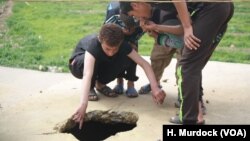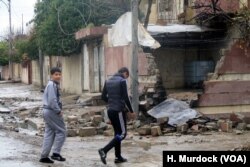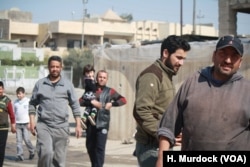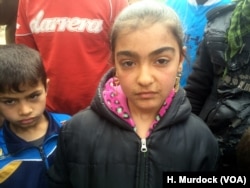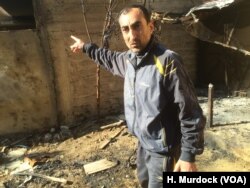What looks like yellow sulphur powder covers everything in the home, and the smell is rancid. Covering their noses with cloth, local boys trudge up the stairs to the roof, being careful not to touch anything.
They examine the hole where an Islamic State bomb fell into the small house about a week ago with a woman and five children inside. It is the home of Natham Hamad, and as of Sunday his two sons, 11 and 12, were still hospitalized in critical condition.
The small crowd quickly departs the poisoned home, and one man warns us not to wear our clothes again until after they are washed.
Nearly everyone in the area has had symptoms like watery eyes and breathing difficulties, residents say, many growing angry as they describe illnesses and feelings of abandonment and neglect. At least 15 people were hospitalized after this and at least four other similar attacks in recent weeks, but most people have very little access to health care.
“We need someone to come here and clean this up,” said Falah Hassan, as the crowd grows near the house despite the smell. “My wife is sick, I have spots on my skin and we can’t breathe at night.” After two-and-half years under Islamic State rule followed by months of war, the area is deeply impoverished, and people here cannot afford private doctors.
In four other neighborhoods, we find many of the same complaints, with the remnants of rudimentary homemade chemical bombs polluting the block surrounding the bombsites. Residents living near all of the sites say the smell is more powerful at night, making them feel like they are suffocating and causing them difficulty in sleeping.
Police say at least some of the bombs contained chlorine and the International Committee of the Red Cross says the symptoms of the patients seen at a hospital in Irbil, about 100 kilometers from Mosul, point to mustard gas.
Foul-smelling remnants of the bombs also appear to vary in substance, with some looking like oil residue, like at the home of Wissam Rashid, 46, who was released from the hospital on Sunday with his wife and brother.
“Just moments before the rocket fell, my son was playing in this place,” said Rashid, a father of three, showing us the the black stains left behind in his now condemned home. The smell is strong enough to make our eyes water in a mater of minutes. “We were lucky he went upstairs to bathe.”
Intense battles
As Iraqi forces battle northward in western Mosul, Islamic State territory is steadily shrinking; but, as they move back, IS militants are fighting back harder and at least one of the poison rockets was shot off from five to seven kilometers away, according to Iraqi Army Major Akeel al-Houssany.
At a base in eastern Mosul, al-Housssany told us continued attacks inside districts that have been controlled by Iraqi forces for months are not a sign of IS strength, but of IS desperation.
“They are trying to send a message with these rockets,” he said. “They want people to think they still have power, but they will be destroyed very soon.”
The United Nations says if confirmed, chemical attacks would be war crimes but officials here seem less concerned. It is not the first alleged chemical attack, as soldiers report IS using similar homemade poison bombs to attack them in Ramadi last year and in recent weeks.
Officials also stress that the majority of the injuries from the alleged chemical attacks have been minor amidst a war that has displaced more than 210,000 people and overwhelmed the growing number of hospitals and clinics surrounding Mosul, which take new casualties every day.
In the impacted neighborhoods, locals say lack of health care and information after these bombings are more alarming than traditional IS attacks, like mortar fire, sniper fire and car bombs. Without information about what is poisoning them or how it may impact their long-term health, parents say they have no way to protect their children.
“Even if we go to the hospital there is no medicine there,” said Yunis Jassim, 20, over the growing din of angry residents outside Hamad’s poisoned home. "What are we supposed to do?"
Fear and frustration
Across the river in western Mosul, Iraqi forces face fierce battles but they are moving forward daily, and officials say the collapse of IS in Mosul is imminent.
“At the beginning, they would at least take the identification cards off the bodies of their dead,” said al-Houssany. “Now they leave the bodies and guns behind.”
Locals, however, say IS and affiliate groups were destabilizing Mosul for years before IS established rule over the area, and a complete victory is unlikely to result in complete safety for families.
“Security forces are still arresting IS militants,” said Mahmoud Abd, a father of three at his chicken stand near another condemned home on Wednesday. “But not as much because people are becoming afraid to turn them in. If they don’t get convicted, they may kill the accuser.”
The smell from the homemade chemical bomb dropped a few doors down more than a week ago is noticeably stronger than it was on Sunday. When the bomb dropped, it failed to explode, but putrid smoke billowed out as the family inside fled.
On Sunday, Iraqi forces detonated the bomb to prevent it from going off by accident, intensifying the smell of the poison, says Abd. So far they have heard the rudimentary bomb may have contained weed killer, toilet draining salts, methanol and sulphur.
“They came and tested the area,” added Abd. “But we never saw the results. We want to know exactly what it is.”




